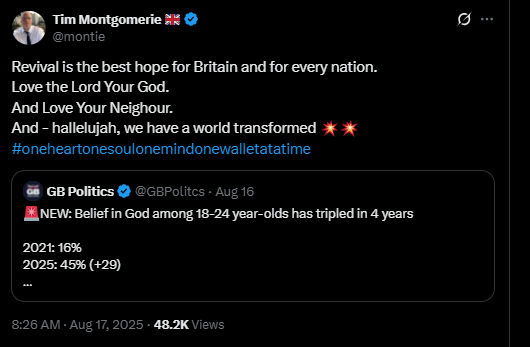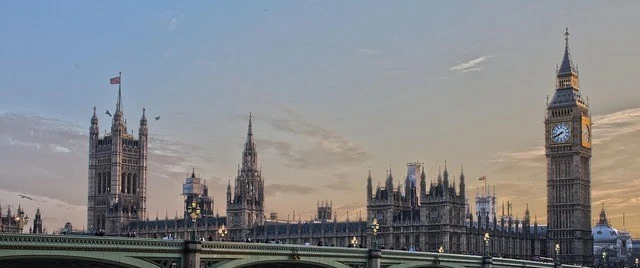Tim Montgomerie is celebrating a supposed resurrection of the religious right among young Britons.
When right-wing commentator Tim Montgomerie of the Reform Party took to Twitter to celebrate a supposed revival of faith among Britain’s youth, it sounded like the start of a new campaign line.
“Revival is the best hope for Britain and for every nation. Love the Lord Your God. And Love Your Neighbour. And – hallelujah, we have a world transformed.”
This pious cheerleading followed a claim that belief in God among 18–24-year-olds has jumped from 16% in 2021 to 45% in 2025 from a YouGov poll shared on GBNews. A startling rise on paper, yes. But is it really the dawn of a British religious right, or just a passing statistical blip?
Imported culture wars, British context
Unlike the United States, Britain has mostly kept politics and religion at a cautious arm’s length. The Church of England still enjoys ceremonial privilege, yet overtly evangelical political language is unusual here. The key question is whether we are seeing genuine spiritual change or a political pose dressed up in scripture.
Montgomerie’s line – “Revival is the best hope for Britain” – reads less like personal faith and more like ideology. That is exactly why it deserves scrutiny.
The problem with cherry-picking the Bible
Scripture is rarely applied consistently in politics. Verses about neighbourly love are paraded on banners, while awkward passages about slavery, stoning, and dietary laws are quietly ignored.
It is not a new critique. One of the sharpest takedowns of biblical literalism on television came from The West Wing. President Josiah Bartlet, tired of a right-wing radio host calling homosexuality an “abomination,” delivered this memorable scene. We have linked the clip and provided a transcript below.
The West Wing “Bible scene” transcript (Season 2, “The Midterms”)
President Bartlet: Good. I like your show. I like how you call homosexuality an “abomination.”
Dr Jenna Jacobs: I don’t say homosexuality is an abomination, Mr President. The Bible does.
Bartlet: Yes it does. Leviticus.
Jacobs: 18:22.
Bartlet: Chapter and verse. I wanted to ask you a couple of questions while I had you here.
I’m interested in selling my youngest daughter into slavery, as sanctioned in Exodus 21:7. She’s a Georgetown sophomore, speaks fluent Italian, always cleared the table when it was her turn. What would a good price for her be?
While thinking about that, can I ask another? My Chief of Staff Leo McGarry insists on working on the Sabbath. Exodus 35:2 clearly says he should be put to death. Am I morally obligated to kill him myself, or is it okay to call the police?
Here’s one that’s really important because we’ve got a lot of sports fans in this town: touching the skin of a dead pig makes one unclean. Leviticus 11:7. If they promise to wear gloves, can the Washington Redskins still play football? Can Notre Dame? Can West Point?
Does the whole town really have to be together to stone my brother John for planting different crops side by side? Can I burn my mother in a small family gathering for wearing garments made from two different threads?
And so, what say you?
The scene is sharp, darkly funny, and it exposes the absurdity of applying ancient rules wholesale to modern life. If you want scripture in policy, you have to take all of it, not just the bits that suit the day’s argument. After all, Timothy 12 would have all kinds of issues with current discriminatory legislation, if you aren’t au fait:
do not permit a woman to teach or to exercise authority over a man; rather, she is to remain quiet.
Is a UK religious right really forming?
Poll numbers about belief do not automatically translate into political power. Britain lacks the large evangelical infrastructure that shapes American politics. Turning sentiment into voting blocs, lobbying strength, and moral legislation requires money, media, and organisation over many years.
Even if religious sentiment is ticking up among some young Britons, attempts to legislate via scripture will run into the same problem The West Wing highlighted. You cannot cherry-pick the past and expect a coherent modern policy. It collapses under basic scrutiny.
Conclusion
Something may be stirring, or it may be a passing mood. Either way, “revival” as public policy is theatre, not governance. Faith is personal. Law in a modern democracy must serve everyone – believers and non-believers alike – without leaning on Bronze Age rules that fall apart the moment you read the next verse.




